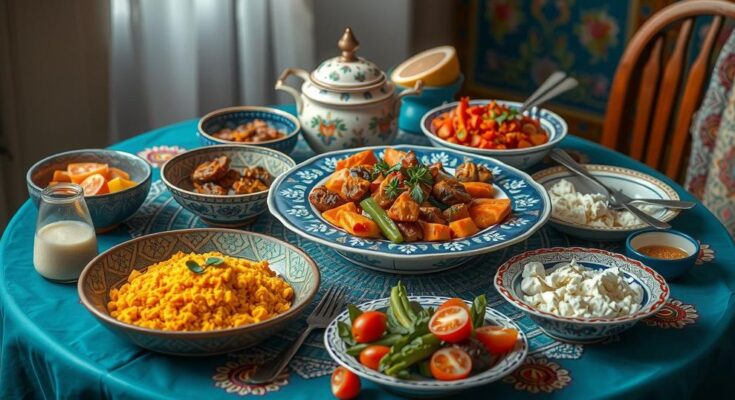Kazakh cuisine reflects its rich cultural heritage, prominently featuring horsemeat alongside traditional dishes. Dining experiences in renowned restaurants such as Auyl and Qazaq Gourmet invite guests to explore local flavors in immersive settings. The resurgence of traditional cooking highlights the significance of food in Kazakh culture, emphasizing communal ties and the comfort of home-cooked meals. Experiencing homemade dishes, often regarded as the truest representation of Kazakh cuisine, offers visitors a deeper understanding of the nation’s identity.
Kazakhstan’s culinary landscape is a profound reflection of its culture and heritage, especially highlighted by the renowned Auyl restaurant in Almaty. Recognized among the world’s most beautiful dining establishments, Auyl embodies the neo-nomadic spirit associated with Kazakh cuisine. While foreign visitors may initially find the emphasis on horsemeat somewhat daunting, Kazakh cuisine is surprisingly rich and simple, offering a unique gastronomic experience that both comforts and satisfies. Kazakhstan’s diet, dominated by meat, particularly in the face of the harsh climate and challenging winters, has been a critical source of nourishment for generations. The cultural significance of meals cannot be overstated, as they are often intertwined with social gatherings and traditions. As an inveterate traveler, I advise newcomers to embrace the local culinary experiences without bias, as this opens up a new world of flavors. Kazakhstan’s hospitality is rooted in its historical encounters with numerous cultures, a legacy that enriches its culinary offerings. In recent years, there has been a resurgence in exploring traditional Kazakh cuisine. The dining scene is thriving as chefs incorporate local ingredients into their dishes, echoing the wisdom of their ancestors while innovating for contemporary palates. A visit to the Auyl restaurant is essential for anyone in Almaty. The ambiance is evocative of Kazakh nomadic traditions, providing an immersive experience at round tables that resonate with familial warmth. The menu features traditional dishes such as baursak and balqaimaq, where each bite conveys the richness of Kazakh culinary culture. In Astana, Qazaq Gourmet serves classic dishes like beshbarmak, which translates to “five fingers,” emphasizing the tradition of eating with one’s hands. This dish, deeply rooted in Kazakh culture, is a centerpiece for significant gatherings. The accompanying horsemeat broth is not merely a meal component but serves as a rejuvenating elixir post-winter excursions. Selfie restaurant offers a modern twist on Kazakh cuisine, situated on the 18th floor and evoking luxury while maintaining traditional elements. Unique offerings like horse heart tartare and ice cream inspired by traditional Kazakh tea showcase the restaurant’s dedication to local ingredients and vibrant flavors. While Kazakh dining establishments offer exquisite experiences, nothing surpasses the comfort of home-cooked meals. Friends made during one’s stay in Kazakhstan may extend invitations to their homes, where authentic dishes are served, capturing the essence of familial love and culinary excellence. Chefs, such as Evgeniy Chekanin, attest that the finest beshbarmak often comes from humble kitchens, reflecting the deep connection between food and the concept of home in Kazakhstan. Meal gatherings echo ancient traditions, reminding us that despite modern conveniences, the craving for connection remains strong.
Kazakh cuisine is intricately linked to the nation’s history of nomadic lifestyles and its geographical challenges. Centered around hearty meals, particularly meat, it serves as nourishment and sustenance for the people. The recent recognition of traditional Kazakh restaurants and a newfound appreciation for local culinary heritage signify a cultural renaissance. This evolution incorporates historical influences while inviting local communities to rediscover ancestral flavors, creating a vibrant dining scene that emphasizes both tradition and modernity.
In conclusion, Kazakh cuisine represents more than mere sustenance; it embodies cultural identity, traditional practices, and the significant human connections cultivated around shared meals. The resurgence of interest in homemade dishes and the celebration of local ingredients reveal a tapestry of flavors that speaks to the heart of Kazakh culture. Visitors to Kazakhstan are encouraged to take part in this culinary journey, fostering relationships that enhance their overall experience of the country’s rich heritage.
Original Source: astanatimes.com




